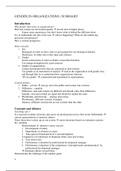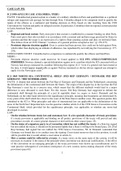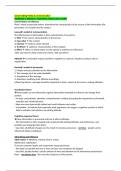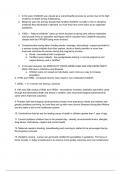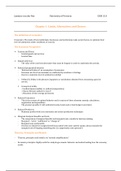Summaries - Readings Week 1
1. Furlong and Marsh: A skin, not a sweater - Ontology and epistemology in political science Reader: 1-9 2
2. Gaddis: History, Science, and the Study of International Relations Reader: 46-53 5
3. Heywood: What is politics? Reader: 113-126 7
,International Relations and International Organization Political Science
1. Furlong and Marsh: A skin, not a sweater - Ontology and epistemology in political science
Each social scientist’s orientation is shaped by ontological and epistemological position, often implicit
rather than explicit. These issues seem difficult but the point is that they are not issues that can be
avoided: they are like a skin not a sweater; cannot be put on and taken off whenever the researcher
sees fit. One’s ontological position affects, but far from determines, one’s epistemological position.
1. Ontology and epistemology
Ontology
Ontological positions are prior because they deal with the very nature of ‘being’ (Greek ‘existence’).
The key question is whether there is a ‘real’ world ‘out there’ that is independent of our knowledge.
Epistemology
The epistemological position reflects a researcher’s view of what we can know about the world and
how we can know it. Literally, an epistemology is a theory of knowledge. Two key questions:
1. Can an observer identify ‘real’ or ‘objective’ relations between social phenomena? If so, how?
This question takes us back to ontology: if one is an anti-foundationalist, then one argues that there
is not a ‘real’ world. At the same time, such an anti-foundationalist would also suggest that no
observer can be ‘objective’.
-> this is also called the double hermeneutic: the world is interpreted by the actors (one hermeneutic
level) and their interpretation is interpreted by the observer (a second hermeneutic level)
2. To the extent that we can establish ‘real’ relationships between social phenomena, can we do this
through direct observation, or are there relationships which ‘exist’ but are not directly observable?
There are different ways of classifying epistemological positions. The most common classification
distinguishes between scientific (sometimes positivist) and hermeneutic (or interpretist) positions:
- Scientific tradition: In particular, the empiricist tradition played a crucial role in the development of
social science. The adherents of the scientific tradition saw social science as analogous to science;
they were foundationalist (believing that there is a ‘real’ world ‘out there’). They focus on identifying
causes of social behaviour. The emphasis was on explanation and many felt that use of rigorous
‘scientific’ methods would allow social scientists to develop laws, which would hold across periods.
- Hermeneutic or interpretist tradition: Adherents are anti-foundationalist, believing that the world is
socially constructed. They focus upon the meaning of behaviour. The emphasis is upon
understanding, rather than explanation. As such, it is not possible to establish causal relationships
that hold across time and space.
According to the authors, ontological and epistemological concerns cannot, and should not, be
ignored or downgraded. Three points are important here:
1. Certainly, the issues involved are not easy, but neither are they difficult, if they are explained
simply and with appropriate examples.
2. Ontological and epistemological positions should not be treated like a sweater that can be ‘put on’
when we are addressing such philosophical issues and ‘taken off’ when we are doing research.
3. Researchers cannot adopt one position at one time for one project and another on another
occasion for a different project. These positions are not interchangeable because they reflect
fundamental different approaches to what social science is and how we do it.
2. Different approaches to ontology and epistemology
The positivist position
- Positivism is based upon a foundationalist ontology: world exists independently of our knowledge.
- To the positivist, natural science and social science are broadly analogous. In this view, and in clear
contrast to the realist, there are no deep structures that cannot be observed. Traditionally,
positivism contended that there is no appearance/reality dichotomy. So, direct observation can serve
as an independent test of the validity of a theory. Interpretists rarely accept any notion of objectivity.
2
, International Relations and International Organization Political Science
- To positivists the aim of social science is to make causal statements. They share this aim with
realists, while interpretists deny the possibility of making such statements
- Positivists also argue that it is possible to separate empirical questions from normative questions.
Therefore, it would be possible for social science to be objective and value-free. Realists and
especially interpretists would reject that proposition
- Many social scientists are positivists, although much of the positivism is implicit rather than explicit.
The criticism of positivism takes two broad forms:
1. Positivists misinterpret how science really proceeds. There are two lines of argument:
1. First, there is the pragmatist position of Quine who develops two crucial critiques:
- Any knowledge we derive from the five senses is mediated by concepts we use to analyse it,
so there is no way of classifying, or even describing, experience without interpreting it
- This means that theory and experiment are not simply separable, rather theory affects both
the facts we focus on and how we interpret them. This, in turn, may affect the conclusions
2. Second, there is Kuhn’s view that science tends to be dominated by a particular paradigm
that is unquestioned and which affects the questions scientists ask and how they interpret
what they observe. Consequently, scientific investigation is not ‘open’ as positivism implies,
rather certain conclusions are unthinkable
2. There are obvious differences between social and physical or natural phenomena that make social
‘science’ impossible.
-> some positivists minimise these differences, but, to the extent that they are accepted, they point
towards a more interpretist epistemological position
Many positivists avoid these critiques which are put in the ‘too hard basket’. However, the more
sophisticated positivists are aware of these criticisms and the position has changed as a result. ‘Post-
behaviouralists’ or ‘post-positivists’: acknowledge the interdependence of theory and observation;
recognise that normative questions are important and not always easy to separate from empirical
questions. As such, this post-positivism has moved a significant way from more traditional positivism.
So, positivism has changed in response to criticism. Post-positivism is much less assertive that there
is only one way of doing social science. However, the ontological and epistemological problems have
not gone away: explanation, rather than understanding, and the primacy of direct observation
remains to be emphasized. Thus, it is still foundationalist and firmly located in the scientific tradition
The interpretist position
- Notion that the world exists independently of our knowledge of it is rejected: the world is socially or
discursively constructed. This view is diametrically opposed to positivism, but shares certain features
with realism. In ontological terms, it is anti-foundationalist.
- It is the interpretation/meanings of social phenomena that are crucial: interpretations/meanings
which can only be established and understood within discourses or traditions. We should, therefore,
focus on identifying those discourses and establishing the interpretations and meanings they attach
to social phenomena
- ‘Objective’ analysis is impossible. Social ‘scientists’ (of course, interpretists would not use this term)
themselves operate within discourses or traditions. Knowledge is, thus, theoretically or discursively
laden. As such, this position acknowledges the double hermeneutic
This position has clear methodological implications: quantitative methods may produce misleading
data. we need to utilise qualitative methods to help us establish how people understand their world.
The major criticism comes from positivists: the interpretist tradition would merely offer opinions or
subjective judgements, and would not have a basis on which to judge the validity of their knowledge
claims. However, most researchers do believe that it is possible to generalise, if only in a limited
3


